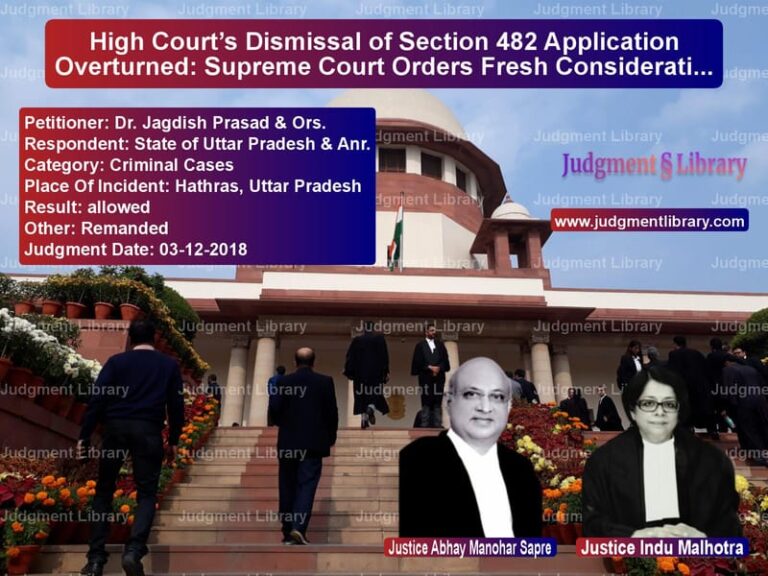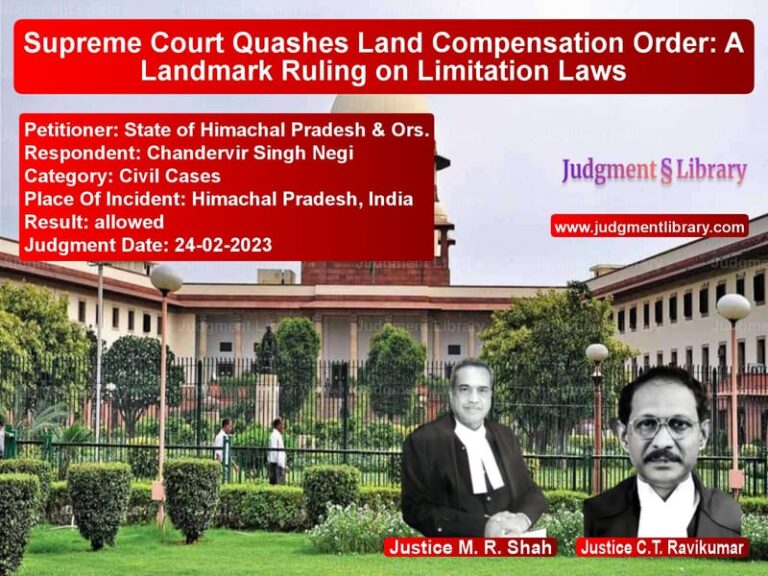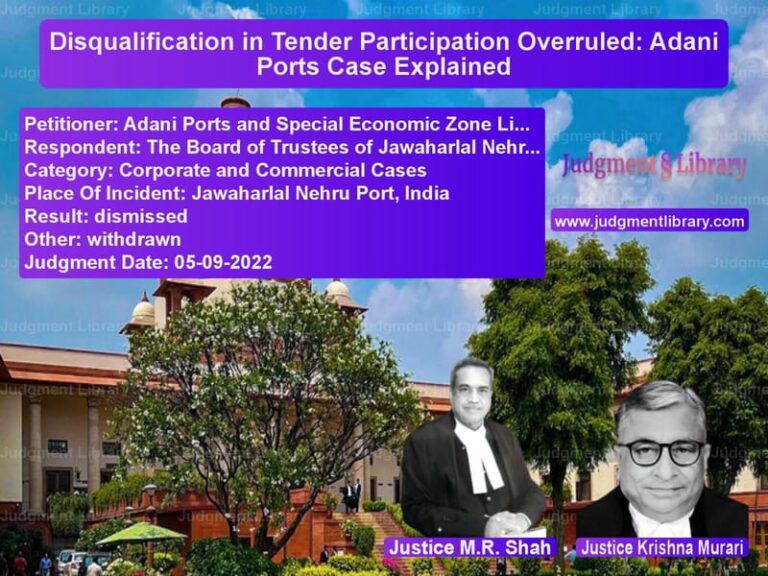Supreme Court Dismisses Lakhani Housing’s Appeal Against MHADA’s Redevelopment Tender in Guru Tegh Bahadur Nagar
The Supreme Court of India recently delivered a significant judgment in the case of Lakhani Housing Corporation Pvt. Ltd. & Anr. vs. The State of Maharashtra & Ors., dismissing the appeal filed by Lakhani Housing against the e-tender issued by the Maharashtra Housing and Area Development Authority (MHADA) for the redevelopment of Guru Tegh Bahadur Nagar. The judgment, authored by Justice K. Vinod Chandran and Justice Sudhanshu Dhulia, delves into the complexities of contractual rights, public interest, and the role of government agencies in urban redevelopment.
The dispute centered around a 11.20-acre land in Mumbai, known as Guru Tegh Bahadur Nagar, which once housed 25 dilapidated buildings accommodating around 1200 families. These buildings, classified as Category C-1 by the Brihanmumbai Municipal Corporation (BMC), were demolished in 2019 due to their dangerous condition. The appellants, Lakhani Housing, claimed to have entered into redevelopment agreements with individual residents and spent approximately Rs. 17.31 Crores on initial steps. However, the project stalled due to issues with title deeds, which the appellants later facilitated by obtaining proper conveyances from the President of India.
The crux of the matter was whether MHADA’s intervention through an e-tender, based on a government resolution, interfered with the contractual rights of Lakhani Housing. The appellants argued that the land was privately owned and that MHADA had no jurisdiction to intervene. They also claimed that 909 out of 1200 occupants had consented to their redevelopment plan. On the other hand, MHADA contended that the unregistered agreements with individuals were unenforceable and that the redevelopment was necessary for public interest, given the plight of the evicted residents.
The High Court of Bombay had earlier dismissed Lakhani Housing’s writ petition, stating that the remedy lay in civil court and not under Article 226 of the Constitution. The Supreme Court upheld this view, emphasizing that the appellants had failed to substantiate their claims of expenditure and enforceability of the agreements. The Court also noted that the majority of the residents and housing societies supported MHADA’s intervention, which was carried out under Regulation 33(9) of the Development Control and Promotion Regulations (DCPR).
Key Arguments of the Petitioners (Lakhani Housing):
Mr. C. A. Sundaram, the learned Senior Counsel appearing for the appellants, argued that the subject land was privately owned and that MHADA’s e-tender interfered with their contractual rights. He pointed out that Regulation 33(9) of the DCPR allowed private developers to undertake redevelopment with the consent of the majority of residents. He also highlighted that the appellants had obtained agreements from 909 occupants and had spent considerable sums on the project. To address concerns, the appellants offered to provide 635 sq. feet of built-up area, matching MHADA’s offer, despite their original agreement for 550 sq. feet.
Key Arguments of the Respondents (MHADA and Others):
Mr. Tushar Mehta, the learned Solicitor General appearing for MHADA, countered that the unregistered agreements with individuals were unenforceable. He emphasized MHADA’s statutory mandate to undertake redevelopment projects, especially in cases involving dilapidated buildings and public interest. He also pointed out that the appellants had failed to commence construction despite a decade passing since the project was initiated. Mr. Shyam Divan, representing 17 out of the 25 housing societies, reiterated that the residents had been left without proper accommodation or corpus funds, necessitating MHADA’s intervention.
Court’s Observations and Decision:
The Supreme Court observed that MHADA’s intervention was justified under Regulation 33(9) of the DCPR, which permits joint development with land owners or housing societies. The Court noted that the erroneous description of the land as government-owned in the government resolution was inconsequential, as the redevelopment was supported by the majority of residents. The Court also found that the appellants had not substantiated their claims of expenditure or enforced their agreements in a civil court. Ultimately, the Court dismissed the appeal, stating that the appellants had no locus standi to challenge the e-tender in a writ proceeding.
The judgment underscores the balance between private contractual rights and public interest in urban redevelopment, affirming the role of statutory agencies like MHADA in addressing housing crises.
Petitioner Name: Lakhani Housing Corporation Pvt. Ltd. & Anr..Respondent Name: The State of Maharashtra & Ors..Judgment By: Justice K. Vinod Chandran, Justice Sudhanshu Dhulia.Place Of Incident: Guru Tegh Bahadur Nagar, Mumbai.Judgment Date: 16-04-2025.Result: dismissed.
Don’t miss out on the full details! Download the complete judgment in PDF format below and gain valuable insights instantly!
Download Judgment: lakhani-housing-corp-vs-the-state-of-maharas-supreme-court-of-india-judgment-dated-16-04-2025.pdf
Directly Download Judgment: Directly download this Judgment
See all petitions in Property Disputes
See all petitions in Contract Disputes
See all petitions in Public Interest Litigation
See all petitions in Judgment by K. Vinod Chandran
See all petitions in Judgment by Sudhanshu Dhulia
See all petitions in dismissed
See all petitions in supreme court of India judgments April 2025
See all petitions in 2025 judgments
See all posts in Civil Cases Category
See all allowed petitions in Civil Cases Category
See all Dismissed petitions in Civil Cases Category
See all partially allowed petitions in Civil Cases Category







